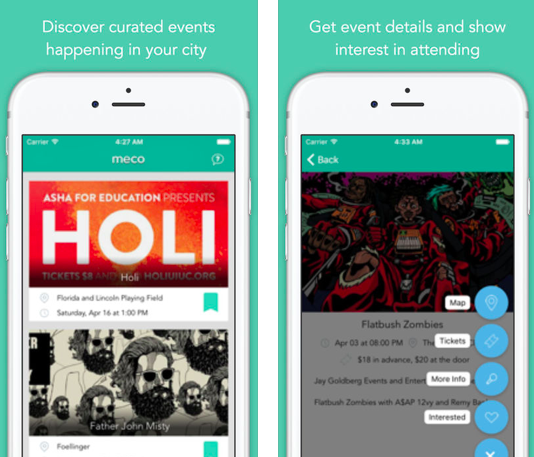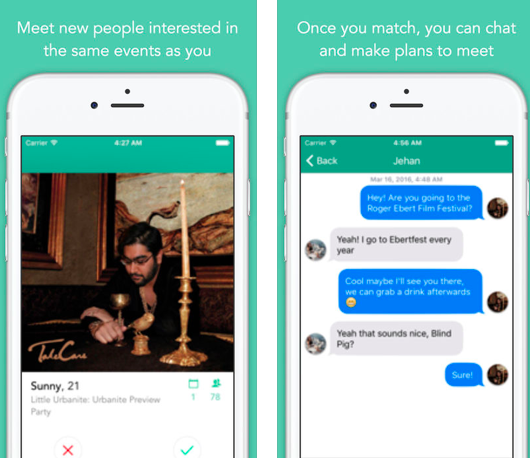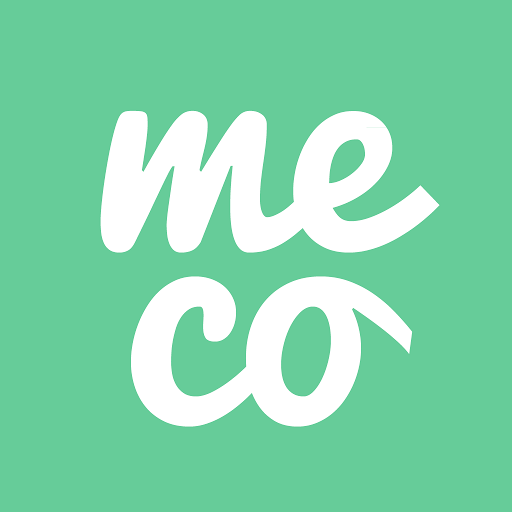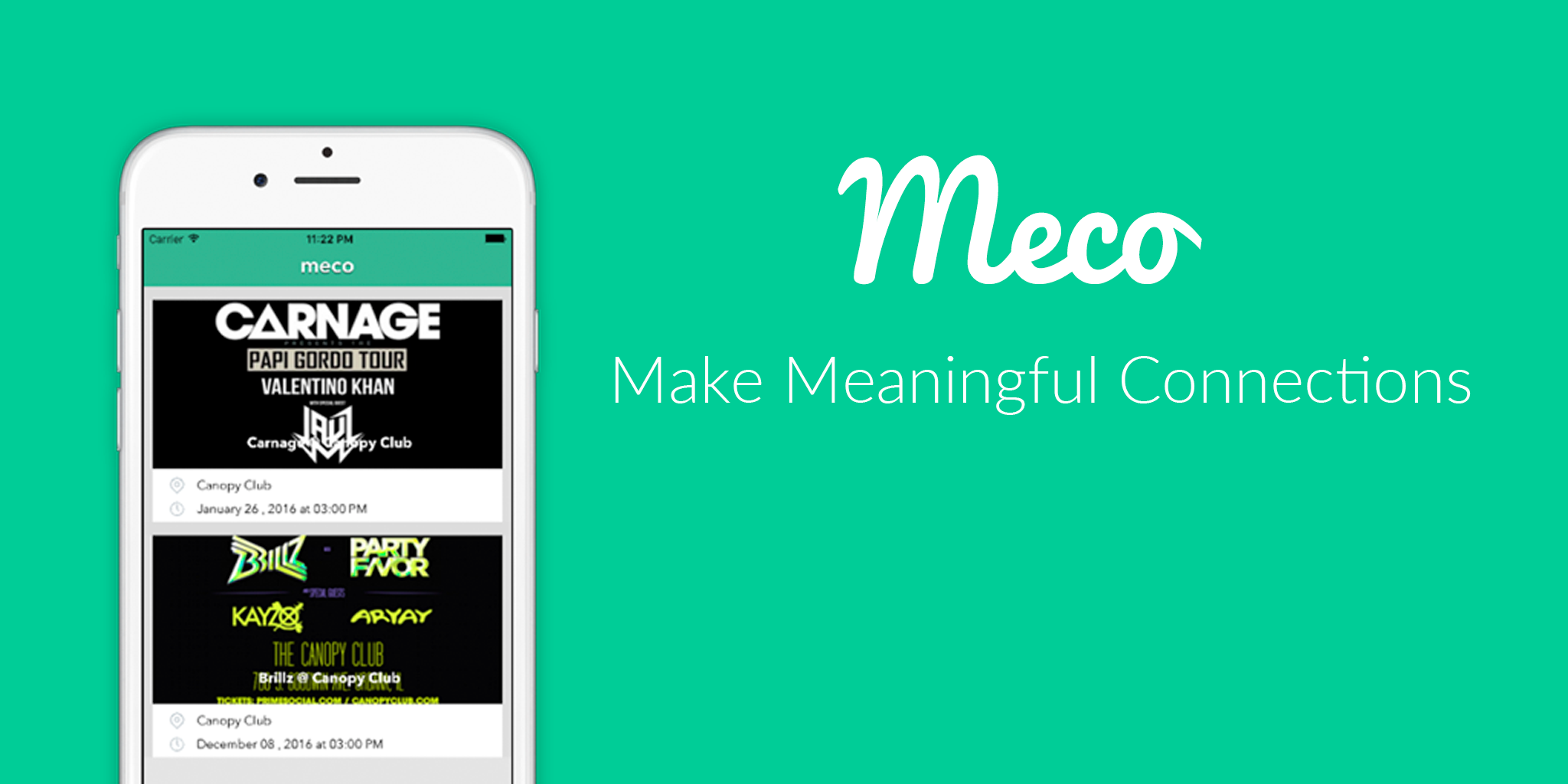Let’s face it: the market for “meet up” apps is almost saturated. Everyone has heard of Tinder, Grindr, and Blendr, and nearly daily someone is trying to introduce a new app that fills some kind of hyper-specific niche: Floundr, the hook-up app for Innsmouth folk; Tailr, the app for people who like making clothing; Growlr, the app for dogs, and the list goes on and on. In addition to these hook-up apps, there also exist apps for finding local events (Eventbrite and Circle, to name just two of the myriad), but few apps bring the two concepts together, and even fewer do it well. While definitely fulfilling some of the stereotypes about such apps (like the fact that it could simultaneously be used to find friends or love interests), Meco is hoping to bridge the gap between meet up and event apps (the gapp?).
Meco is like other “meet up” apps in the sense that the user has a profile and gets matched with people with whom he/she may get along. The interesting part is that the app also identifies and provides detailed information about local events. You don’t just meet people based on common metrics, but rather based on events that you are both planning to attend. In this way, Meco hopes to establish more MEaningful COnnections than disposable pairings.
Neel Kothari and Sunny Pruthi, the minds behind Meco, met while at Startup Bootcamp, hosted by Founders. At the time, they were working on separate projects and didn’t fully understand how well they could work together. To put it simply, Pruthi (a senior in computer engineering at U of I) was trying to answer the question of how to generate better and more organic matches through meet up apps, whereas Kothari (a senior in computer science at U of I) was looking to answer the question of how to properly curate events digitally. Later on, Pruthi gave a presentation on his project in a class (not surprisingly, a class on how to start a startup, which he coincidentally shared with Kothari). Kothari immediately recognized that they could join forces to create a product greater than the sum of its parts. I met with the two entrepreneurs at a cafe in campustown. They were excited enough to talk about Meco to tolerate my caffeinated presence.
“The question is: can we make something people need, rather than want,” Kothari says assuredly. In many ways, it seems as though Meco is trying a more natural approach to the making friends (or more-than-friends) game. Many of you may not remember this, but in the days before apps, people used to meet people with similar interests while doing similar things. Maybe you’d meet someone while standing in line to get into a concert, or helping someone fix a flat at a bike rally, or haggling over the last CD at a show, or chained to someone while cleaning up the same stretch of highway in orange jumpsuits (boy, middle-school sure was great!). Meco brings that kind of basic and simple connection into the Cyborg age of perpetually being attached to mobile devices and wired to the Internet.


To further distinguish it from other meet up apps, the idea of “shared interests” is really not all that important to Meco. The app is based on the idea that someone whose profile says they like Heavy Metal may not necessarily get along with someone who takes a day off of work to go see Iron Maiden in concert, but two people who both took the day off of work to see Iron Maiden in concert most likely will get along. Kothari and Pruthi understand that the things one does are more telling of one’s personality than the things one says one does.e
By focusing on events rather than arbitrary profile details, the app also helps to ignite the initial spark of conversation. Meco users don’t necessarily have to worry about what to talk about with someone they match with using the app — you already know what event you have in common. And furthermore, if you add someone to your friend list, their profile will show you what events you had in common with them in the past to help you have some kind of context to the friendship. No longer will you stare at your friends list and think, “How the hell do I even know these people?”
In this day and age, it’s no longer considered weird to have met a friend or a significant other through an app. Still, many people have concerns about safety. This is another facet of the experience that Meco is attempting to improve. By restricting the events in the app to relatively large, public events, Meco is removing the shady factor of meeting someone new in a strange and (perhaps) dangerous place.
Meco’s current method of collecting event and profile information is yet another firewall protecting its users. To join, one downloads the app and then signs into it with one’s Facebook account. The Meco profile is populated with some information from Facebook (name, age, and profile picture), which can be altered later on. Currently, all of the events are also collected from Facebook events.
Kothari explained that one of the challenges of scraping Facebook for event information is that sometimes a posting doesn’t reflect the hard work that goes into an event or its legitimacy. “If a posting is in all-caps or full of grammatical errors, it might make an event look unprofessional, or at least like something different than it is,” he said. “When we take information about events from Facebook, we clean them up and make them look a little better, a little more polished.” If anything, it seems like they should be able to market that algorithm to Facebook so they can make their own event posts nicer. It certainly seems like Facebook could use it.
By drawing user and event information from Facebook, Meco guarantees that there is an additional layer of security (namely, Facebook’s) between their users and malevolent entities. The hope is that this will prevent false profiles, fake events, and other misrepresentations which have led to undesirable outcomes with other apps. No longer will you be worried that “Jim from Pennsylvania” is actually a very clever grizzly bear. Also, there is the concern that lazy millennials wouldn’t be willing to use an app that requires an additional 45 seconds to fill out a profile with name, age, and pictures, so by taking information from a Facebook account Meco is lowering the barrier to entry. As much as I cringe whenever I heard the word “millennial”, I have to admit that this is just another way that they prove they understand their target demographic.
Some might be concerned about the necessity of Facebook and iOS to run the app. Pruthi and Kothari admit that the version of the app currently available in the App Store (it only works on iOS at the moment, but more on that later) is sort of a “soft-release” or working beta version. The app is incredibly stable, and has enough functionality to let people use it to meet new people and attend events, but it will definitely be better fleshed out in the future, hopefully allowing users to join without having a Facebook account or an iPhone.
Despite just being in a “soft-release” state, the app can already boast about 130 users. While that may seem like a small number for a meet-up app, one has to remember that not only is the app very young, but also that there has been no advertising other than word-of-mouth.
“It’s a chicken-and-egg problem,” Pruthi said. “To be successful, the app needs to have a lot of people, but it’s hard to get a lot of people using the app until it has proven to be successful.”
Catch-22s aside, the pair have worked hard to ensure that the app is as successful as possible. They have been actively listening to feedback from the app’s users and implementing things as quickly as possible. For instance, they realized quickly that just a user’s Facebook profile picture wasn’t really enough for someone to get a good feel for the person, so they allowed for more pictures in someone’s profile. It was also pointed out by some users that there was a problem with the chat system, and it wasn’t truly acting instantaneously. They worked hard and fixed that to make it real-time.
I don’t happen to have a Facebook account or an iDevice, so I wasn’t able to try out the app, but Pruthi and Kothari were more than happy to show me how the app worked on their phones. I will admit, it seemed straightforward, simple, and intuitive (all the hallmarks of a good Apple app, from what I understand). On the home page, there are two tabs: Upcoming and My Events. The Upcoming tab lists events that are upcoming near the user. Each event has a picture and a date and location associated with it. By tapping on the picture, the user is taken to more detailed information about the event. From the event’s page, the user can tap buttons to take them to a place to buy tickets (powered by Eventbrite), a map to the location of the event (powered by Apple Maps), to declare interest in the event (and add it to their My Events tab), or to take them to even more info.
Once a user expresses interest in an event, the app will check to see if there are any people for the user to pass judgement upon. If there are, the user will see a red “New” bubble above the “Meet” icon in the app. The user can then tap the “Meet” icon and be judge, jury, and executioner (or, rather, swiper) for the potential matches. Even without expressing interest in an event, however, users can go to the “Meet” section in the app to see if they have any potential matches. Although it isn’t a feature yet, in the near future, the app will let users know if they have potential matches they haven’t yet acted upon one way or the other.

When visiting another user’s page one can see mutually liked events, mutal friends, and view the person’s pictures. The user can then swipe right (yes) or left (no) to add the person to their friends list, or reject them respectively.
The two, Pruthi and Kothari, are dedicated to the app wholeheartedly. Before they graduate, they are hoping to increase the user base and prove the usefulness of the app. They consider 500-1000 users before their graduation to be a plausible and celebration-worthy achievement. After they graduate, if possible, they’d like to turn running and improving on the app into their careers.
You might wonder how they’re going to pay the rent running this app, especially considering the app is free to use. I was likewise curious. Almost everyone knows that to make money off of something, you have to find a way to monetize it, and the Meco team think they’ve found that by helping the venues they feature to improve themselves.
You see, in the course of its operation, Meco will be handling massive amounts of data regarding popular venues, dates and times for those venues, events, demographics, and a plethora of other bits and pieces. Pruthi and Kothari are confident that they’ll be able to strip this information of anything user-identifying, and then sell it to venues to help the venues improve. Furthermore, they are content with the idea of having “sponsored venues” who will help them financially to be featured more prominently within the app. If they can make these cash flows work, they can ensure that not only will the app stay free, but venues will also improve and become better and more fun places to experience shows or events.
The app is young and evolving. The duo discussed with me the idea of having people swipe right or left on various topics — types of events, music venues, genres, etc. — to not only generate more data for the company, but also to help them find people with whom they’ll better get along. Eventually, people may be able to suggest events that they know about (provided they fulfill certain criteria). Pruthi and Kothari, more than anything, want to ensure that the app never ceases to be useful and evolves along with the changing tastes of its users.
But, as I’ve said, none of this will matter if people don’t take the plunge and start using the app. Considering that it’s free, safe, and seems to solve a bothersome and near perpetual problem, I can’t imagine why anyone with an iDevice and a Facebook wouldn’t at least give it a try. If it doesn’t work out for you, at least there’s the safety net of deleting it?








